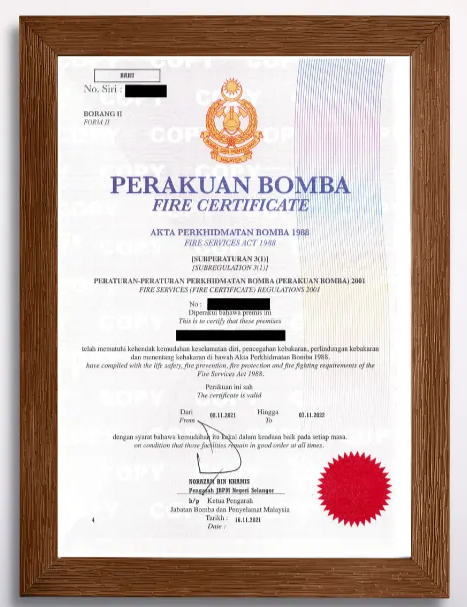The Significance of Fire Certificate Management for Industries
Effective fire safety management plays a crucial role in protecting industrial assets, ensuring the safety of employees and visitors, and maintaining full compliance with regulations. One essential part of this process is the active management of fire certificates. By managing these certificates consistently, industries strengthen their overall fire safety strategy and reap long-term benefits.
What is a Fire Certificate?
A fire certificate is an official document issued by the relevant authorities. It confirms that a building or facility has met all necessary fire safety standards. This certificate proves that the company has taken steps to implement fire safety systems, procedures, and equipment to safeguard people and property in the event of a fire. Therefore, industries must treat fire certificates as a priority in their safety management plans.

Why Fire Certificate Management Matters
1. Ensuring Compliance with Fire Safety Regulations
Industries must keep valid fire certificates to comply with local laws and safety requirements. Without proper certification, businesses risk facing legal actions, fines, and forced shutdowns. Moreover, authorities expect industries to stay updated with any changes in safety codes. By managing fire certificates consistently, companies maintain legal standing and operate without unnecessary interruptions.
2. Protecting Life and Property
Fire certificates require industries to implement comprehensive safety measures. These include fire detection systems, emergency exits, evacuation plans, and firefighting equipment. With proper management, companies can conduct regular checks and updates on all safety systems. As a result, they reduce fire risks and protect the lives of everyone on the premises.
3. Conducting Risk Assessment and Mitigation
Managing fire certificates involves regular fire risk assessments. Through these assessments, companies identify potential fire hazards and take steps to eliminate or control them. They also review escape routes, fire alarm functions, and extinguisher placement. Consistent assessment leads to better fire preparedness and lowers the chances of fire-related accidents.
4. Enhancing Emergency Response Capabilities
Fire certificate requirements include the creation of emergency response plans. These plans detail evacuation procedures, fire drill schedules, and coordination with local fire services. By managing these requirements actively, industries ensure their teams know exactly what to do in a fire emergency. As a result, they improve response speed and reduce panic during actual incidents.
5. Meeting Insurance Requirements
Many insurance providers demand valid fire certificates before offering fire coverage. With proper documentation, industries show insurers that they have taken steps to reduce fire risks. This often leads to lower insurance premiums and faster claims processing. Companies that manage their fire certificates well enjoy better insurance deals and fewer coverage issues.
6. Building Reputation and Stakeholder Confidence
Industries that focus on safety earn respect from employees, clients, and business partners. When companies manage fire certificates properly, they show a strong commitment to safety and responsibility. This commitment improves their public image and builds trust with stakeholders. In the long run, a good reputation can attract more customers and strengthen business relationships.
Conclusion
In conclusion, fire certificate management should be a top priority for every industry. It supports compliance, protects people and assets, reduces risks, strengthens emergency preparedness, meets insurance conditions, and improves reputation. By handling fire certificates proactively, industries create a safer work environment and show a genuine commitment to protecting their teams and properties.
Lastly, click the link to read more about FERA’s Fire Certificate Management: https://fera.com.my/fire-safety-management/fire-certificate-management-for-industry/